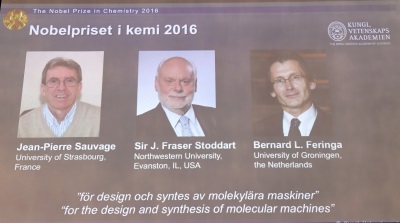Nobel chemistry prize sparks delight from mini-motor maker

Sparks of delight flew as Dutch scientist Ben Feringa jointly won the Nobel Prize in Chemistry on Wednesday for his work in creating miniscule motors.
The 65-year-old professor from the University of Groningen and chairman of the scientific board at the Royal Netherlands Academy of Arts and Sciences, told NPO Radio 1 he was ebullient.
‘This is the dream of every scientist, and I can’t deny I also dreamed about it,’ he said, reports NOS. ‘There are tens of thousands of good chemists, so it is a great surprise to be selected. It is very moving, and I did get emotional.’
The prize was shared with the French scientist Jean-Pierre Sauvage, and Scotsman Sir Fraser Stoddart, for work in developing ‘the world’s smallest machines’ that paved the way for the first smart materials.
They will share an award of 8 million Swedish kronor (approximately €830,000).
In 2011, Feringa created the first synthetic motor, a tiny device that keeps turning in response to light. He added: ‘I often feel like the Wright brothers, who built the first primitive plane. Nobody knew exactly what to do with it.’
But, NOS reports, scientists hope it may have applications in finding and neutralising cancer cells or in delivering insulin to people with diabetes.
Thank you for donating to DutchNews.nl.
We could not provide the Dutch News service, and keep it free of charge, without the generous support of our readers. Your donations allow us to report on issues you tell us matter, and provide you with a summary of the most important Dutch news each day.
Make a donation